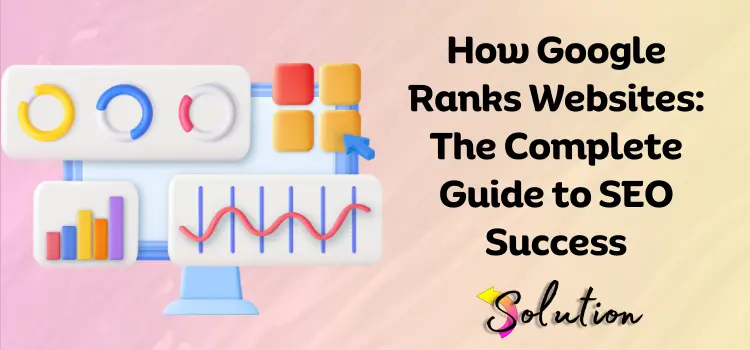
Whenever a query is raised in your mind, you go to Google, search for the query, and get instant results.
But have you ever wondered how these results are ranked on the results pages? Based on which factors are the results ranked from top to bottom?
Well, that’s from the user’s point of view. However, for businesses, everyone wants to see their website ranking at the top and above their competitors. Crawling, indexing, and ranking are the three different processes that Google uses to determine the order of search results.
If needed, search engines can easily rank websites depending on the word count, content freshness, or accuracy. So, why is there a need to process a website through different processes to determine its ranking? This is not only lengthy but also necessary to provide users with the most relevant and accurate search results.
Understanding behind the scenes how a search engine works is essential for website owners and digital marketers to optimize their content and improve their online visibility. In this guide, we are going to break down the detailed process of how a search engine ranks websites, what factors they consider, and how you can get your website ranked at the top.
A). Understanding Crawling: The Gateway to Search Engine Rankings
Crawling is the foundational process that allows search engines to discover, understand, and index content across the search engine. Through this process, the search engine evaluates what content exists, which pages are more valuable, and how frequently they should visit them for updates.
Under this process, search engine bots, often referred to as spiders or crawlers systematically scroll the internet to gather information about websites and their content. These bots move from one page to another by following the links and creating a map of the interconnected web pages in the process.
Crawling serves as the first step in the search engine optimization (SEO) process as it determines which pages will be included in the search results. It is the most crucial and essential step in ensuring that websites are properly indexed and can be found easily by users searching for accurate or similar information.
A.1) Why Does Crawling Matter for Your Website?
Without crawling, search engines wouldn’t be able to recognize your website, meaning your potential users won’t be able to find it through searches. It helps in ensuring that your website is visible and accessible to a wider audience, ultimately resulting in higher traffic and potential conversions. The consequences of not having your website crawled properly are as follows:
- Invisibility in search results
- Lack of indexing
- Search Engine may struggle to understand your website structure
- Slow Updates in Search Results
- Failure in Mobile-First Indexing
A.2) Ways to Optimize Your Website for Crawling
Here are some effective tips and ways through which you can optimize your website to ensure proper crawling by search engines:
- Submit an XML sitemap
- Create a clear site structure.
- Use Robots.txt effectively.
- Optimize images, leverage caching, and use fast hosting to improve page speed and loading times.
- Repair or fix broken links
B). The Indexing Process: The Backbone of Search Engine Rankings
Once a search engine like Google has crawled a website, then the next crucial step is indexing. While the crawling process includes discovering content, indexing is all about understanding, storing, and organizing it in the easiest way to retrieve it when a user performs a search query.
Indexing allows search engines to quickly access and display relevant information to users, ultimately impacting the website’s ranking in search results. The crawling process transforms the raw data into structured and searchable information, which powers the entire search engine process.
The search engine bots analyze the content and categorize it from each webpage to ensure it can be retrieved and served to users efficiently. This categorization is important for search engines to provide accurate and relevant results based on the user’s query.
Here’s how to understand both crawling and indexing: Crawling is like collecting books from various publishers, whereas indexing is organizing those books in a library and categorizing them for easy reference.
Read Also:- Why Long-Form Content is the Secret Weapon for Skyrocketing Organic Rankings
B.1) Why does indexing matter for your website?
Indexing allows a website to show up in search engine results. Without being indexed, your content will remain invisible to potential visitors, which means you’re missing out on the organic traffic.
Let’s take a look at some other reasons that reflect why indexing matters for your website:
- With properly indexed content, search engines can quickly identify and display fresh updates.
- Search engines only rank pages that are part of their index. So, without indexing, all the SEO work you put into creating valuable content won’t count anymore.
- It increases the website’s chances of appearing in the search results for the right queries, which helps drive more organic traffic.
- Indexing allows search engines to understand your website more accurately and assists them in serving relevant content to users based on their search queries.
- The higher the quality of your website’s pages, the more likely it is that search engines will consider it trustworthy or authoritative.
B.2) Strategies to Optimize Your Site for Search Engine Indexing
Optimizing your site for search engine indexing is not a one-time task but an ongoing process that requires continuous effort and monitoring. Although we have mentioned some effective ways and strategies that you can follow to optimize your website for search engine indexing:
- Ensure all your pages are accessible to search engine bots. Use tools like Google Search Console to identify any crawl errors and fix them promptly.
- Add high-quality, unique, and keyword-rich content to your website that aligns perfectly with the user’s query.
- Make sure no important pages on your site inadvertently receive the no-index meta tag, as this stops search engines from indexing them.
- Use an online URL inspection tool to quickly check the indexing status of your important pages and make sure they are properly crawled by search engines.
C). Understanding Ranking: The Final Success Step to Search Engine Success
Once a website has been successfully crawled and indexed, then it’s time for the most critical step in SEO, i.e., ranking. Ranking typically determines the sequence in which the web pages appear on the Search Engine Result Pages (SERPs) when users search for a relevant keyword.
Ranking refers to the position a website or webpage holds on the SERP. It indicates how a website is performing in terms of visibility and traffic generation. Whenever a user searches for a query, the search engine’s algorithm analyzes it and retrieves the most relevant results from its index. The search engine algorithm then displays these results in descending order of relevance and authority, placing the highest-ranking pages at the top of the SERP.
The ranking is not static, as it changes over time as the search engine updates its algorithm and as the website updates its content. The technical SEO, keyword targeting, and content performance of your competitor’s website also influence your website ranking.
C.1) Key Factors That Influence Website Ranking
Understanding the different factors that influence the website ranking can help you determine the relevancy and quality of a page. Furthermore, these key factors will help in optimizing your website to improve its ranking and visibility on search engine result pages.
- Content Quality: The content should be original, comprehensive, and detailed. It must fulfill the user’s intent and include relevant keywords in a natural flow without any stuffing.
- Ensure your website meets all the standards for technical SEO. It should be crawlable and indexed. Furthermore, try optimizing page speed and performance to reduce the bounce rates.
- On-page SEO including title tags, meta descriptions, and headers with relevant keywords.
- Backlinks: Search Engines use backlinks to build the trustworthiness and credibility of your content, which significantly helps in improving ranking.
- User Experience: A website that offers a positive user experience i.e. fast loading time, easy navigation, and clear CTAs is often more favored by search engines.
C.2) Tips to Improve Your Website Ranking
Let’s take a look at some of the effective ways and strategies that you can follow to improve the organic ranking of your website on search engine result pages:
- Identify and use relevant keywords that match your target audience’s search intent. You can use tools like Google Keyword Planner or Ahrefs for keyword research.
- Try building trustworthy and high-quality links from authoritative sources through partnership, guest blogging, or content promotion.
- Try using images, videos, or infographics on your website. This will make it easy for your target audience to grab information easily and engage with your content in a more visually appealing way.
- Try covering border information on your website by incorporating FAQs, case studies, or testimonials.
- Boost page load speed by compressing images, minimizing HTTP requests, and using a content delivery network (CDN).
D). The Top Ranking Signals Google Considers for #1 Spot
Seeing their website rank #1 on the SERPs is still the dream for many entrepreneurs or digital marketers. While this is a dream of many marketers, many of them have already achieved this goal by understanding and implementing the top-ranking signals that Google considers.
Here is a list of the top-ranking signals that Google considers at any cost when marking a website as #1 on the result pages:
- Original, high-quality, and user-friendly content is one of the primary factors that you should consider in order to get your website ranked higher.
- Use effective on-page and technical SEO tactics.
- Relevant keywords should be placed in content, headings, and alt text.
- Google prefers regularly updated content, especially for time-sensitive topics, as it demonstrates freshness and relevancy.
- If you optimize your content to match user intent, Google will match results with user intent, increasing your content’s ranking.
- When URLs are descriptive, keyword-rich, and easy for both humans and search engines to grasp, rankings go up.
- By utilizing internal links correctly, you can aid Google in comprehending your site’s structure and guarantee that crucial pages are scanned and indexed.
- Images, videos, and infographics can improve user experience and engagement, which in turn boosts rankings.
Conclusion
Understanding how Google ranks web pages is crucial for anyone working in digital marketing or owning a website looking to boost its visibility in search engines. This procedure, which includes crawling, indexing, and ranking, guarantees that only top-quality, relevant content will show up in search results. You may greatly improve your chances of ranking higher in the SERPs by concentrating on elements like user experience, technical SEO, and high-quality content.
But SEO takes time and effort. Staying ahead of Google’s constantly changing algorithms necessitates constant tweaking and strategic strategizing. To constantly boost your ranks and attract organic traffic, you should concentrate on optimizing crawling, making your content more relevant, and keeping your website structurally good.
To succeed in the long run, you need to keep up with the newest SEO trends and comprehend the ranking signals as Google’s algorithms change. You may improve your chances of ranking well and make your site more enjoyable for visitors and search engines alike by adhering to these best practices.
If you want your business to stand out in the crowded internet arena, you need a website that is easy to find, relevant, and competitive. The correct methods can help you do just that.


